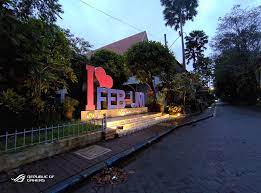UNIVERSITAS NEGERI MALANG - PENDIDIKAN AKUNTANSI
Akreditasi
A
Strata
S1
Perminatan
SAINTEK
Website
https://feb.um.ac.id/en/page-jurusan/page-akuntansi/s1-akuntansi-02/
Sekilas Tentang PENDIDIKAN AKUNTANSI
SEJARAH
In
1979-1982 the Department of Corporate Governance was also known as the
Department of Business Education. Then in 1982 the names and terms of
the existing faculties were adjusted nationally, FKIS changed to the
Faculty of Social Sciences Education (FPIPS). One of the existing majors
is the Business World Education Department (PDU). The PDU Department is
a combination of two departments, namely General Economics and Business
Education. Starting in 1984, the Department of Business World Education
(PDU) has study programs, namely: (1) Diploma III and S1 Cooperative
Education Study Programs; (2) Diploma III and S1 Accounting Education
Study Program; (3) Business Education Study Program Diploma III and S1;
(4) Office Administration Education Study Program Diploma III and S1;
and (5) Diploma II and Diploma III Service Skills Education Study
Programs. Since 1990 the Service Skills Education Study Program does not
accept new students, so the PDU Department has only four study
programs, namely: S1 Cooperative Economic Education (EKOP); S1
Accounting Economics Education (AKT); S1 Trade Education (TTN); and S1
Office Administration Education (ADP).
Since 1996
based on the Decree of the Director General of Higher Education Number
246 / DIKTI / Kep / 1996 dated 11 July 1996 the PDU department has
changed to the Department of Economic Education. The Department of
Economic Education has 4 concentrations, namely; Economic Education and
Cooperatives (KOP) Concentration, Accounting Education Concentration
(AKT), Business Administration Education Concentration (TTN) and Office
Administration Education Concentration (ADP).
Based on the Presidential
Decree of the Republic of Indonesia Number 93 of 1999 concerning the
Change of the Teaching and Education Institute, IKIP MALANG changed to
Malang State University with the abbreviation (UM). The Presidential
Decree was followed up by the issuance of the Decree of the Director
General of Higher Education, Ministry of Education and Culture of the
Republic of Indonesia Number 206 / DIKTI / Kep / 1999 dated May 6, 1999,
concerning the Implementation of the Management Education Undergraduate
Study Program at FPIPS IKIP MALANG, namely the Management Study Program
at the Bachelor level ( S1). Graduates from the study program hold an
academic degree in Economics, abbreviated as the Decree of the Director
General of Higher Education, Depdikbud RI, Number 336 / DIKTI / Kep /
1999 dated July 12, 1999, concerning the Implementation of the
Non-Educational Study Program Diploma in Accounting and Marketing
Management at FPIPS IKIP MALANG, a Study Program has been held. Non
Education Accounting and Marketing Management for Diploma III (D-III)
level. Graduates from this study program are given the title
Professional Associate Expert, abbreviated as A.Md.
Changes in
the Economic Education Study Program are based on the Decree of the
Director General of Higher Education Number 1791 / D / T / 2005 dated
May 25, 2005. Initially there were four concentrations in the study
program, namely: Economic Education with a concentration on
Cooperatives, Economic Education with a concentration on Commerce,
Economic Education with a concentration on Office Administration, and
Economics Education with a concentration in Accounting. On the basis of
the decree, the four study programs were separated. So, at this time in
FE UM there are four educational study programs, namely the Economic
Education Study Program, the Commerce Education Study Program, the
Office Administration Education Study Program, and the Accounting
Education Study Program.
Furthermore,
based on the Decree of the Director General of Higher Education Number:
4857 / D / T / 2004 dated December 30, 2004 dated December 30, 2004, FE
UM was granted a permit to organize a non-educational Accounting Study
Program for the Undergraduate level (S1). After a year later, based on
the Decree of the Director General of Higher Education Number 3144 / D /
T / 2005 dated 26 September 2005 FE UM was granted a permit to organize
a non-educational Development Economics Study Program for the
undergraduate level (S1). Graduates from the two study programs hold an
academic degree in Economics, abbreviated as SE
The
existence of FE UM is getting stronger with the Decree of the Minister
of Education and Culture of the Republic of Indonesia dated 14 October
1999 concerning the Organization and Work Procedure of the State
University of Malang (OTK UM), and the Decree of the Minister of
National Education of the Republic of Indonesia Number 170 / U / 2000,
dated 21 September 2000 regarding the Statute State University of
Malang, where FE is one of the five faculties in UM with three majors:
Management, Accounting, and Development Economics (Decree of the
Director General of Higher Education Number 143 / DIKTI / Kep / 2000
dated May 12, 2000 regarding Types and Number of Departments in Faculty
within UM Article 5).
To
complement the organization, it has been appointed through the Rector's
Decree, the Head of the Faculty of Economics consists of the Dean,
Assistant Deans, Head of the Department and Secretary of the Department.
The inauguration of the aforementioned faculty leadership has been
carried out by the Rector of the State University of Malang on November
3, 2000, so that since then the organizational elements of the Faculty
of Economics have been completed. Furthermore, based on the decision of
the Senate meeting of the Faculty of Economics, UM, November 3, 2000 was
designated as the anniversary of the Faculty of Economics, UM.
Following
up on the Decree of the Director General of Higher Education, the UM
Rector's Decree Number 2423 / Kep / PT28.H / U / 2000 was issued on
August 16, 2000 concerning a list of faculties, departments and study
programs in UM. Followed by the issuance of the Decree of the Director
General of Higher Education Number: 4857 / D / T / 2004 concerning the
implementation of the Accounting Study Program (S1) and the Decree of
the Director General of Higher Education Number: 3144 / D / T / 2005
concerning the implementation of the Development Economic Study Program
(S1).
Based on
the Decree of the Minister of Education and Culture Number 270 / U /
1999 and Regulation of the Minister of Education and Culture Number 30
of 2012 concerning Organization and Work Procedure (OTK) of State
University of Malang. The number and names of Study Programs within the
Faculty of Economics for each department are as follows:
Department of Management, manages study programs Management
(S1), Marketing Management (D-III), Commerce Education (S1), and Office
Administration Education (S1).
Department of Accounting, manages the Accounting Study Program (S1), Accounting (D-III), and Accounting Education (S1).
Department of Development Economics, manages study programs
of Economics Education (S1) and Economics, Development Studies (S1),
Economic Education (S2), and Economic Education (S3).
Subsequent developments in 2011
based on the letter of the Director General of Higher Education number
303 / E / O / 2011, dated 21 December 2011, the Faculty of Economics
obtained the mandate to organize the Master of Business Education and
Management study program, 2012 based on the letter of the Director
General of Higher Education number 62 / E / O / 2012, dated March 1,
2012, obtained the mandate to organize the Master of Business Education
and Management study program, and in 2014 based on the letter of the
Director General of Higher Education obtained the mandate to organize
the Master of Accounting study program and the Master of Economics study
program.
LAB
- MICROTHEACHING LAB
- KOMPUTER LAB
PROGRAM STUDI
Vision
As a superior study program and a reference in the implementation of
education, research, and the application of science and technology in
the field of accounting teaching
Mission
- Organizing higher education to produce professional and qualified graduates in the field of accounting education
- Carrying out research and development of knowledge to produce
superior academic work and become a reference in the field of accounting
education
- Providing services to the community through the application of science and technology in the field of accounting education
- Organizing institutional cooperation and developing communication networks with alumni to improve quality and performance.
Destination
Become a teacher in
the field of accounting studies at the high school and vocational high
school education level who has pedagogical, social and personality
professional competences in implementing learning to:
- Designing accounting information systems for service, trading and manufacturing companies
- Prepare and analyze financial reports
- Check financial reports
- Tax practices
- Financial and capital market practices

 MASUK PTN
MASUK PTN